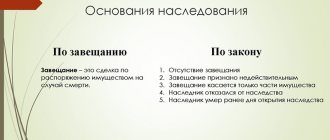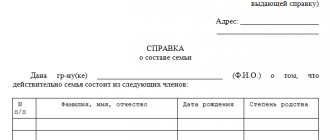Basic terms
As in any science, branch or sub-branch of law, the basic concepts of inheritance law are distinguished. They establish and define the terminology used by both theorists and practitioners. Among the basic concepts, of course, are testator and heir. It is these persons who are the main subjects whose actions the inheritance legislation is aimed at regulating.
The conceptual apparatus also contains the structure of law and its principles, hereditary legal relations and the grounds for their occurrence, the structure and sources of law. It must be remembered that objectively, inheritance law is a set of legal norms regulating specific relationships, and inheritance law in the subjective sense represents the right of a subject to be a testator and the right to be called upon to receive material benefits after the death of a person.
Concept of inheritance
At its core, inheritance is the transfer of rights and obligations from a person who has died to other persons. The institution of inheritance in the civil law system of any legal system, including the Russian legal system, is closely related to all other types of property rights. The question of what remains after the deceased, in what order and to whom property is transferred, from ancient times to the present day remains the focus of attention of society and the state.
It is the institution of inheritance, as part of the country’s civil legislation, that establishes the types of inheritance and their meaning. There are two types of transfer of rights and obligations after the deceased: by law and by will. In order to most fully understand the essence of such a phenomenon as the transfer of rights and responsibilities after death, it is worth studying the wording from the publication “What is inheritance.”
Inheritance according to law
Inheritance by law is still the most common type of transfer of ownership after a person's death. Either due to the human factor, or due to ignorance, Russian citizens rarely, compared to citizens of European and American countries, leave property dispositions in the event of death.
The law provides for the order and mechanism for obtaining the right to property by relatives and close persons of the deceased. The peculiarities of inheritance law in the Russian Federation are that there are seven queues. Basically, all heirs are ranked according to the proximity of their relationship to the deceased or according to the principle of property dependence on him (dependents). Who can claim benefits and in what order, read our article “Inheritance by Law”.
Inheritance according to a will
By making a will, a person leaves a written order regarding all the property that belongs to him during his lifetime. It would seem that in this case you can leave even your closest relatives (which are children and parents) without inheritance and bequeath everything to your first teacher or any other person. However, there are subtleties that we will consider in detail in this article.
Inheritance by will in civil law also presupposes that not only individuals, but also legal entities (enterprises, institutions, organizations), as well as the state and municipalities can inherit.
To be valid and enforceable, a document with the last will expressed in it must be drawn up in notarial form and have all the required details. If you want to be fully prepared before going to a notary, we recommend studying the material “Inheritance by Will.”
Types of inheritance
The inheritance can be various material and intangible benefits that were acquired by the testator: real estate, transport, financial assets, some types of rights. Inheritance is the transfer of all property of the deceased to his heirs on the basis of the law or the left will of the citizen (will). What types of inheritance exist in the Russian Federation?
In law
There are two ways to receive an inheritance in accordance with Article 1111 of the Civil Code of the Russian Federation: by law and by will. The first type is the most private. Its peculiarity is that applicants for entry are identified according to priority. The main recipients of the testator's property are his closest relatives: children, spouses and parents.
Special right of inheritance for spouses: the husband or wife can claim half of the entire inheritance if the property left was jointly acquired, and also a share in the remaining half as a first-priority claimant.
In the absence of the main recipients of the testator's possessions, the right of inheritance passes to the next circle of relatives. The order in 2021 according to the law is as follows:
- Parents, spouses, children.
- Siblings, grandparents.
- Dear uncles and aunts.
- Great-grandparents.
- Cousins and aunts, grandchildren.
- Cousins and great-grandchildren.
- Step relatives: stepmother, stepfather, stepdaughter and stepson.
In the absence of all types of heirs, the property left by the testator is transferred to the benefit of the state. Acceptance of an inheritance is required by law within six months from the date of death of the owner. Otherwise, the inheritance right will pass to another order of recipients.
The basis for considering a citizen as a successor will be documents proving a family relationship with the deceased. These may be marriage or birth certificates, guardianship or adoption orders.
By will
Another type of inheritance is obtaining rights under a will. The right of every citizen is to dispose of his property during his lifetime and to indicate any circle of applicants who will become recipients of the property after his death (Article 1119 of the Civil Code of the Russian Federation).
A will is a document that is drawn up in a notary's office and expresses the will of the applicant regarding his rights and possessions. In this case, both a relative and a person who has no family ties with the testator can become an heir.
The document indicates both one and several applicants for receiving the inheritance. The testator may or may not indicate the size of the share of each recipient. In this case, the notary will divide the property equally between all persons indicated in the document.
The possibilities of a will are not limited only to the choice of heirs. The testator has the right to indicate unworthy successors who will not be able to enter, even if they have the right to do so by law.
The basis for registering inheritance in this situation will be a testamentary document. Receivers need to find the paper and provide it to the notary's office to confirm their rights to the property.
Under contract
Relatively recently, a new type of inheritance has appeared - by contract. During his lifetime, the testator enters into an agreement with another person or organization to provide services in exchange for the right to inherit acquired property.
An example of this type would be an agreement for the care of an elderly person by a legal or natural person in exchange for the right of inheritance.
The parties' agreement on mutual benefit is registered at a notary's office. In this case, the recipient of the testator’s property will be the responsible party if the terms of the agreement are fulfilled in good faith. The rights of other applicants by law and by will in the presence of such a document are not recognized.
It is impossible to terminate the agreement unilaterally. The consent of both parties is required. A contract can only be terminated individually in court if there are compelling arguments: failure to fulfill obligations by the responsible person due to his dishonesty or due to certain situations, for example, illness.
Right to mandatory share
When inheriting by law and by will, there is a category of successors who have the right to an obligatory share. These include:
- Dependents of the testator who lived on his territory and had financial dependence for a period of at least a year.
- Incapacitated or disabled spouses, parents and children of the deceased.
- Minor children, including from a previous marriage.
A child who is not born but conceived during the life of the testator has the right to an obligatory share in the inheritance of his father.
The size of the mandatory share is 50% of the part that could go to the recipient as part of inheritance by law. The allocation of property occurs from the total mass of the deceased’s possessions, and also by reducing the shares of other existing claimants.
Article 1149 of the Civil Code of the Russian Federation allows for a reduction or abolition of the obligatory share due to certain circumstances. For example, if the common part is small and its physical separation is impossible from indivisible property, for example, an apartment or house. The decision on such action is made only by the court.
How does the inheritance open?
According to inheritance law, the date of opening of inheritance is the day of a person’s death or the entry into force of a court decision declaring a person dead. From this moment, within six months, everyone who has the right to claim the property of the deceased (or who considers himself such) must contact the notary office at the last place of residence of the testator. The notary will open the inheritance case, for which the first applicant will need to present a death certificate.
Deadlines in inheritance
The death of the testator must chronologically precede the opening of proceedings along one of the paths of inheritance. After its completion, the notary is obliged to notify all potential participants about the event. If the announcement of the death of a citizen is made as part of a legal battle, the discovery date will be the day on which the act drawn up by the judge comes into force.
The time allotted for citizens to enter into an inheritance (regardless of the type of transfer of property) is six months. Missing the deadline entails losing the chance to receive a share. In this case, their share passes to other participants in the case. But the rule has an important nuance: the citizen must argue in court that the reason for the absence was valid. Then we will talk about restoring rights and reviewing the inheritance case.
The question of the correct determination of jurisdiction is decided in a particular court. As a rule, the place of commencement of proceedings is the last place of residence of the deceased testator. If difficulties arise in determining the location, the notary initiates a review at the location of the most expensive part of the property.
Statements of claim are sometimes returned to the court with a note indicating that jurisdiction has been incorrectly determined. The reason is that the dispute affects the interests of other parties, so the claim should be filed at the place of residence of the defendant (one of the participants in the inheritance process).
How to inherit
In order to enter into an inheritance, you need to submit a statement of such intention to the notary's office.
A public notary's office or a private notary must be located in the notarial district in which the deceased was permanently registered at his place of residence.
If the place of residence is unknown, then the inheritance case should be opened where the bulk of the property included in the inheritance mass is located (most often these are land or real estate). What is inherited property and what is included in it, you can find out by consulting with a lawyer or reading about it below.
The notary will review the documents submitted by the applicant, establish family ties with the deceased and determine the order of inheritance. The inheritance mass will also be identified, that is, all property and property rights that belonged to the deceased by right of ownership. The process of entering into an inheritance will end with the issuance of a certificate of inheritance to the heirs. We describe the entire process in more detail in the article “Entering an Inheritance.”
Inheritance - interpretation of the concept
There are many definitions of inheritance. This is due to the fact that inheritance as a right is studied by legal science, and, accordingly, has a scientific, purely theoretical definition.
In addition, inheritance as a process very often takes place in notarial and judicial practice, and a lot of explanations are given regarding it by notary chambers and higher judicial authorities.
We have combined all the descriptions and explanations into one publication, “How the law defines the concept and order of inheritance.”
What are inheritance relations?
The relationships that arise in the process of inheritance are called hereditary. A striking example of this type of legal relationship is a will, which in its legal essence is a one-sided transaction.
The one-sided nature of the will is manifested in the fact that the disposal of rights is carried out only by the testator, while the heir does not carry out any volitional actions when drawing it up.
However, this statement causes as much controversy as the question of whether inheritance is a civil or family law.
In jurisprudence, there is an opinion that a will, like a donation, is a bilateral transaction, requiring action on the part of the heir, as well as the recipient, to accept property.
At a minimum, the heir needs to write a statement and come to the notary.
More theoretical considerations on this topic can be obtained from our article “Inheritance Legal Relationship”.
Procedure for entering into inheritance
Entering into an inheritance involves performing a number of actions. And not chaotic, but orderly.
It makes no sense to demand from a notary, for example, to issue a certificate of inheritance rights if an inheritance case has not yet been opened. Civil law sees inheritance as a logical sequence of actions of heirs.
Entering into an inheritance begins by contacting a notary with an application to accept the inheritance. Based on this application, an inheritance case is opened, within the framework of which the notary and all persons interested in receiving the property will carry out the actions we are talking about.
In the end, all heirs will receive the appropriate certificates, if no controversial situations have arisen, or will go to court to sort things out.
In order not to waste time and effort, and to clearly know what actions are being performed and in what order, we suggest studying the material “How to enter into an inheritance.”
What is inheritance by law
Having understood what inheritance is, let's move on to studying its types. Since inheritance relations are regulated quite clearly by the legislation of the Russian Federation, inheritance by law is most common. It occurs if the deceased during his lifetime did not make any orders regarding the property belonging to him after his death.
In such circumstances, it is the law that determines which of the heirs, in what sequence and in what proportions will receive the inheritance.
In particular, the first priority heirs are children, spouses and parents. If inheritance in accordance with the legislation of the Russian Federation is carried out by first-priorities, then the entire inheritance mass is distributed among them in equal proportions, and the heirs of the next priority are no longer called upon to inherit.
There are, however, features that need to be taken into account when dividing the inheritance. We are talking about the spouse’s right to a share in joint property, the obligatory share of disabled relatives, the right of representation, etc.
To get a complete picture of inheritance without a will, pay attention to the analysis of the legislative framework and law enforcement practice in the article “Inheritance by law.”
Inheritance by will
If a person left instructions regarding his property during his lifetime, then we can talk about inheritance by will. A will is a written document duly certified (usually by a notary).
When there is a will, it is very difficult for persons not named in it to receive anything after the death of the testator.
Inheritance in civil law provides for the protection of the property rights of certain persons, even if they are not mentioned in the will. Moreover, the law makes it possible to challenge a document or invalidate it.
That is why it is important not to make mistakes either in the form or in the content of the will and to draw it up in strict accordance with the letter of the law. The article “Inheritance by will” will help you understand all the nuances in the best way.
Place of acceptance of inheritance
Inheritance by law and by will is carried out at a specific place. The place of acceptance of the inheritance in accordance with the law is the last place of residence of the deceased - permanent or primary.
This means that if a person died on a business trip in another locality, then the inheritance should be opened in the city or village where he lived.
Any address in a populated area belongs to a notarial district in which notaries and the state notary's office work. An application for acceptance of an inheritance (also known as an application for opening an inheritance) is submitted to a notary office located in the notarial district in which the deceased lived. Details in the material “Place of acceptance of inheritance.”
Deadline for inheritance
The property of the deceased cannot be in a state of uncertainty for a long time.
Any property requires care and attention. Agricultural land must participate in crop rotation and provide public benefit; houses must be maintained in proper condition to prevent accidents.
Therefore, the law requires the inheritance of property of citizens to be carried out within six months from the date of death of a person. During this period, you need to come to the notary’s office with all documents.
If the application has not been submitted, it is considered that the heir has refused the inheritance. But if this happened for good reasons, then the court will provide an additional period for filing an application for acceptance of the inheritance.
In order to do everything on time and avoid the need to go to court, we carefully calculate the deadline for entering into inheritance.
Procedure for accepting an inheritance
The concept of inheritance provides for the transfer of rights in connection with death. Apparently, the start of inheritance relations occurs at the time of a person’s death. This moment is determined by an official document - a death certificate.
In some cases, the starting point may be the date specified in the court decision. We are talking about declaring a person dead or missing.
However, the inheritance procedure itself as a process starts at the moment the first heir applies to the notary with an application to accept the inheritance. From this moment, an inheritance case is opened, within the framework of which the circle of heirs and the list of inherited property will be clarified.
The uncontested procedure will end in six months with the issuance of certificates of inheritance. If there are disputes, the final decision will be made by the court, but it is unknown in what time frame. The article “Procedure for Accepting an Inheritance” will help you do everything correctly.
What do inheritance relations include?
Succession relations, as a subject of inheritance law, are very similar to any civil law relations. They are based on the equality of the parties and the absence of administrative subordination. However, there is a certain feature that distinguishes this type of interaction from others: at the time of the existence of inheritance legal relations, one of the parties is absent due to death.
At the same time, it cannot be said that only one of the parties is present during inheritance, because the will of one of the participants was expressed, but earlier (by drawing up a will or refusing one with a decision to leave everything to the discretion of the law). You can study the details under the heading “Inheritance legal relations”.
Subjects in inheritance law
The testator and heirs are the subjects of inheritance law. They are the actors in the inheritance legal relationship. In accordance with the law, only a person can act as a testator, regardless of his affiliation with the state (citizen, foreigner, stateless person). Legal entities cannot be testators, because the transfer of rights to their property is associated with the liquidation or bankruptcy procedure, and these are other civil relationships.
Legal entities can act as heirs, but only as heirs under a will. Unlike individuals, who inherit both by will and by law.
To inherit property, the heir must have such a quality as hereditary legal capacity.
An important role in inheritance law is played by persons who contribute to the implementation of a person’s last will - a notary, an executor of the will (if one is appointed by the testator), witnesses, heirs, legatees.
The notary plays an important role in the process. Its function is not only to certify the testator’s signature, but also to explain to him the essence of what is happening, the consequences of his actions, and check the mental and physical state of the person (of course, only visually).
The notary also conducts the inheritance case, explains to the heirs their options, directs their actions, and collects information. It is the notary who makes the decision to call the heir to the property or to deny it, establishes family ties and issues a certificate of right to property in the order of inheritance, if the situation is indisputable.
If, by the will of the testator, a person is entrusted with carrying out actions aimed at executing the will, then we can speak of the participation of the executor of the will in the matter. They can be appointed by any person, not necessarily a relative or close person of the deceased.
The legislation provides for the mandatory participation of witnesses when drawing up a will in some cases, for example, in emergency circumstances, when drawing up a closed will. If the person drawing up the order has physical disabilities (deafness, muteness, inability to write), then translators and interpreters are involved in the process, and they also become participants in the legal relationship.
We cannot ignore legatees, that is, participants in the process who, by order of the deceased, are obliged to fulfill any obligations in favor of one or more persons and may receive a certain share of the inheritance for this.
As we can see, the circle of participants in inheritance relations is quite wide and each person has clearly established functions and rights.
Subjects of hereditary succession
Testator
The subjects of hereditary succession are the testator and heirs.
Testator – a person after whose death inheritance succession occurs. It is often noted in the literature that the testator does not become the subject of hereditary succession, since the legal relationship itself arises only after the death of the citizen. It is difficult to argue against this statement. At the same time, data related to the figure of the testator is important for determining the conditions for the emergence of inheritance legal relations.
The testators can be Russian and foreign citizens, as well as stateless persons living in the territory of our country. Legal entities cannot leave inheritance: upon their termination through reorganization, the property passes to other persons in the manner prescribed by law (Article 58 of the Civil Code), and upon their liquidation, universal succession does not arise (clause 1, Article 61 of the Civil Code).
In order to consider a specific person as a testator, it is necessary to confirm his death or in the cases specified in Art. 45 of the Civil Code, the entry into force of a court decision declaring him dead.
Heirs
Heirs are persons specified by law or will as legal successors of the testator.
Any subject of civil law can inherit: a citizen, legal entity, state or municipality. Citizens and the state can be heirs both by law and by will. Moreover, a citizen’s ability to inherit in no way depends on the scope of his legal capacity. Legal entities can act as heirs only if a will is drawn up in their favor.
The circle of persons who can be called upon to inherit is determined by law (Civil Code). First of all, these are citizens who are alive on the day of opening of the inheritance, as well as those conceived during the life of the testator and born alive after the opening of the inheritance (paragraph 1 of Article 1116 of the Civil Code). According to the tradition established in Roman law, they are sometimes called “nasciturus” (from the Latin nasciturus - “fetus in the mother’s womb”), or “postumi” (from the Latin postumi - late, additional).
The Civil Code defines very broadly the circle of those who can be called upon to inherit under a will. In particular, in addition to the named individuals, these are also legal entities existing on the day of opening of the inheritance. In addition, the Russian Federation, constituent entities of the Russian Federation, municipalities, foreign states and international organizations may be called upon to inherit by will. Escheated property is inherited by law by the Russian Federation, and residential premises are inherited by municipalities or the cities of Moscow and St. Petersburg as subjects of the Russian Federation (clause 2 of Article 1151 of the Civil Code as amended by Federal Law No. 281-FZ of November 29, 2007).
Unworthy heirs
In an effort to best protect participants in inheritance relations, the legislator included in the Civil Code norms that prevent unworthy persons from inheriting.
Firstly, citizens who, by their deliberate unlawful actions directed against the testator, any of his heirs or against the implementation of the last will of the testator, expressed in the will, contributed or tried to promote the vocation of themselves or other persons to inherit or increase the share of the inheritance due to them or other persons. These circumstances must be confirmed in court (paragraph 1, paragraph 1, article 1117 of the Civil Code). At the same time, it should be borne in mind that citizens to whom the testator, after they lost the right to inherit, bequeathed property (i.e., essentially forgave them), have the right to inherit it.
Secondly, parents do not inherit by law after children in respect of whom they were deprived of parental rights and were not restored to them by the day the inheritance was opened (paragraph 2, paragraph 1, article 1117 of the Civil Code).
And finally, thirdly, at the request of an interested person, the court excludes from inheritance according to the law citizens who maliciously evaded the fulfillment of their obligations by law to support the testator (clause 2 of Article 1117 of the Civil Code).
If such an unworthy heir somehow nevertheless received certain property from the inheritance, he must return it as unjustly received in accordance with the rules of Chapter. 60 GK.
show content
What does inheritance refer to?
The object of legal relations of inheritance is the inheritance mass, that is, the civil rights and obligations of the deceased, which do not end with death and have the property of being transferred to another person.
The basis of any hereditary mass, or rather, the most significant part of it, most often consists of real estate, land, enterprises, vehicles, money, that is, objects of the material world.
But we should not forget about non-property rights, which often have no less value (copyright, rights to an invention, industrial design, etc.). To better understand the terminology and not waste a lot of time searching for information, we recommend studying the publication “Objects of Hereditary Succession.”
Basic principles of inheritance law
Any theory or science is based on a number of beliefs, basic principles, which are called principles. The principles of inheritance law have an orderly structure, although various scientists and theorists do not agree on their exact number: you can find five, six or even seven basic principles. Civil legislation does not contain a specific article of law in which the principles would be enshrined and formulated at the highest state level, therefore their names are determined scientifically.
For example, the principle of universality of hereditary succession means that all the property of the deceased passes in full to his successors at one time. In this case, the rights are accompanied by responsibilities, if the deceased had any. Lawyers of Ancient Rome spoke about such universality; however, unlike them, Russian legislation rightly limited the obligations of the legal successor to the scope of the rights received.
The principle of inheritance law, which assumes that the testator can freely, at his own discretion, dispose of the property or part of it belonging to him, or not leave any dispositions in the event of his death, is the so-called principle of freedom of testament. In accordance with it, a person can not only determine the circle of persons who can count on something after his death, but also endow them with property or rights in any shares and with the assignment of any responsibilities.
Order of succession
Of course, like any procedure performed in accordance with legally established norms, inheritance is carried out in a certain order. It is not difficult to understand what law determines the order of inheritance: we are talking about the redistribution of property, and all property legal relations of citizens are regulated by civil law. It is the Civil Code of the Russian Federation that establishes how the transfer of rights from the deceased occurs, the procedure for calling for material benefits, the necessary documents confirming various actions, and so on.
Lines of heirs
It is customary to talk about priority only in inheritance by law, that is, in the case when the call to receive property benefits occurs strictly “in order”, provided for by civil law. Since the system of inheritance law includes basic elements, such as principles, institutions, some theorists talk about the order of the will, but exclusively established by the testator himself.
The heirs of each line receive property in equal parts and are called upon to inherit only if there are no successors of the previous line. There are seven queues in our legislation: the closer the successor is to the deceased, the lower the serial number of his queue. How to correctly determine your order among heirs is explained in the article “The order of heirs.”
Methods of inheritance rights
After studying our topic, you will be able to note for yourself what the right of inheritance is. However, it is also worth knowing who exactly has this opportunity. According to the Civil Code of the Russian Federation, there are three forms of transfer of rights to inheritance: contractual, by law and by will. The last two of them are the most relevant and widespread.
The first form is contractual. The essence of this type is determined from its name. An agreement is concluded between the testator and a certain person, which is notarized.
As a rule, the terms of the contract are as follows: a certain person performs certain actions in relation to the testator, for which he receives the right to inherit after his death. A common form of inheritance agreement is a lifelong maintenance agreement.
When concluding an inheritance agreement, the document drawn up is not subject to voluntary termination by one of the parties. The document can be canceled by mutual agreement or if one of the parties fails to fulfill its obligations.
The second form is by law. This is the most common option for the emergence of inheritance rights. Immediately after the death of a citizen, close blood relatives can lay claim to his property. The main right of entry belongs to the parents, children and spouses of the deceased (Article 1142 of the Civil Code of the Russian Federation). The entire inheritance will be divided equally between them (or taking into account additional rights to shares).
The first circle of inheritance by law may be abandoned or completely absent. In such a situation, the right to join is transferred to the next generation of relatives. In total, according to the law, there are 7 queues of receivers, each circle of which can join if the previous link does not accept the property.
When registering an inheritance, according to the law, non-blood relatives do not have the right to apply for accession. Common-law spouses or cohabitants are not candidates for inheritance.
The third form of inheritance is by will. According to Articles 1119–1120 of the Civil Code of the Russian Federation, the testator has the right to freely dispose of his acquired property and transfer it to any person, indicating the appropriate conditions in the will.
In a will, a citizen has the right to indicate his heirs, unworthy applicants and the conditions of acceptance. Often, heirs by law may be deprived of the right to join or may not be mentioned at all in the text of the document. A will cannot be revoked, but during his lifetime the testator has the opportunity to change the document any number of times.
How are inheritance rights protected?
Methods for protecting inheritance rights, as well as other rights, are provided for by civil law. Among them there are both general methods (recognition of rights, recognition of a transaction as invalid, establishment of facts) and those inherent only in this kind of relationship (recognition as an unworthy heir, allocation of a mandatory share, etc.).
Protection of the rights of legal successors is sometimes carried out by the participants in legal relations themselves (restoring the deadline for filing an application for acceptance of an inheritance) or by state authorized bodies (protecting the property of the deceased). Most often, rights have to be protected in court and, since inheritance law is a subbranch of civil law, in accordance with the norms of civil and civil procedural legislation.
Restoring the deadline for accepting an inheritance
The legislator has established that it is necessary to receive property after the deceased within six months from the moment of his death. However, if there are objective reasons and circumstances why this was not done, the specified period may be restored.
Objective reasons will include situations in which the potential successor did not and could not know about the death of his relative, was on a long business trip, undergoing treatment, or served in the army, etc. The restoration of the term occurs in court. Read about the procedure for restoring the deadline and the documents required for this in the article “Restoring the deadline for accepting an inheritance.”
Features of inheritance
The concept of inheritance and inheritance rights have their own characteristics when formalized. For example, Article 1154 of the Civil Code of the Russian Federation defines strict deadlines during which it is permissible to present one’s claims to receive abandoned property. It is possible to carry out actual acceptance or contact a notary's office only within six months from the date of death of the testator. If this period has been missed, then the opportunity to join can be restored in court or on the basis of an agreement with other applicants who have already joined.
The division of property after the death of the giver also has its own characteristics. According to Article 1149 of the Civil Code of the Russian Federation, if there is a will, legal beneficiaries can expect to receive half of their share, but only under the condition of incapacity for work. This must be expressed by disability, retirement age or minor age.
Spouses have a priority right to increase their share in the estate to 50% of it, but only if the property left behind was acquired (received) during the period of official marriage (Article 1150 of the Civil Code of the Russian Federation).
Civil marriage is not recognized by law and such spouses have no rights in relation to each other, including inheritance.
Inheritance rights can be either direct or by right of representation. If the main applicant died before joining, then his successors can receive the property. By right of introduction, only applicants in the first three rankings have the right to enter.
The formation of inheritance law in Russia
The stages of development of inheritance law in Russia are usually associated with periods of development of the state and statehood. Usually, the calculation begins with Ancient Rus' and the normative document called “Russian Truth”, which systematized and streamlined the traditions of inheritance (relatives were identified as the only possible heirs).
Scientists identify the period of the XV-XVIII centuries as quite stable and evolutionary, after which the dynamism of historical events entailed a rapid change of hereditary stages: pre-revolutionary, Soviet and modern.
The current stage is also characterized by stability, so what is new in inheritance law in 2021 affects only the activities of registration authorities.









